
Last time you and I learned how to make parallel books and made a Russian-English version of an excerpt from Harper Lee's novel To Kill a Mockingbird. Today we will take the next step and create a complete multilingual book in eight languages.
Let me remind you that the goal of this project is to create a tool that will help people studying and teaching foreign languages to create study materials and parallel books to improve their reading skills. The global problem is that it is difficult to find interesting material for study with a parallel translation, while it is much easier to find a book in the original and its Russian edition separately.
Let's make seven books first
" ", . ( ); , ( ); . , . . pdf .
-.
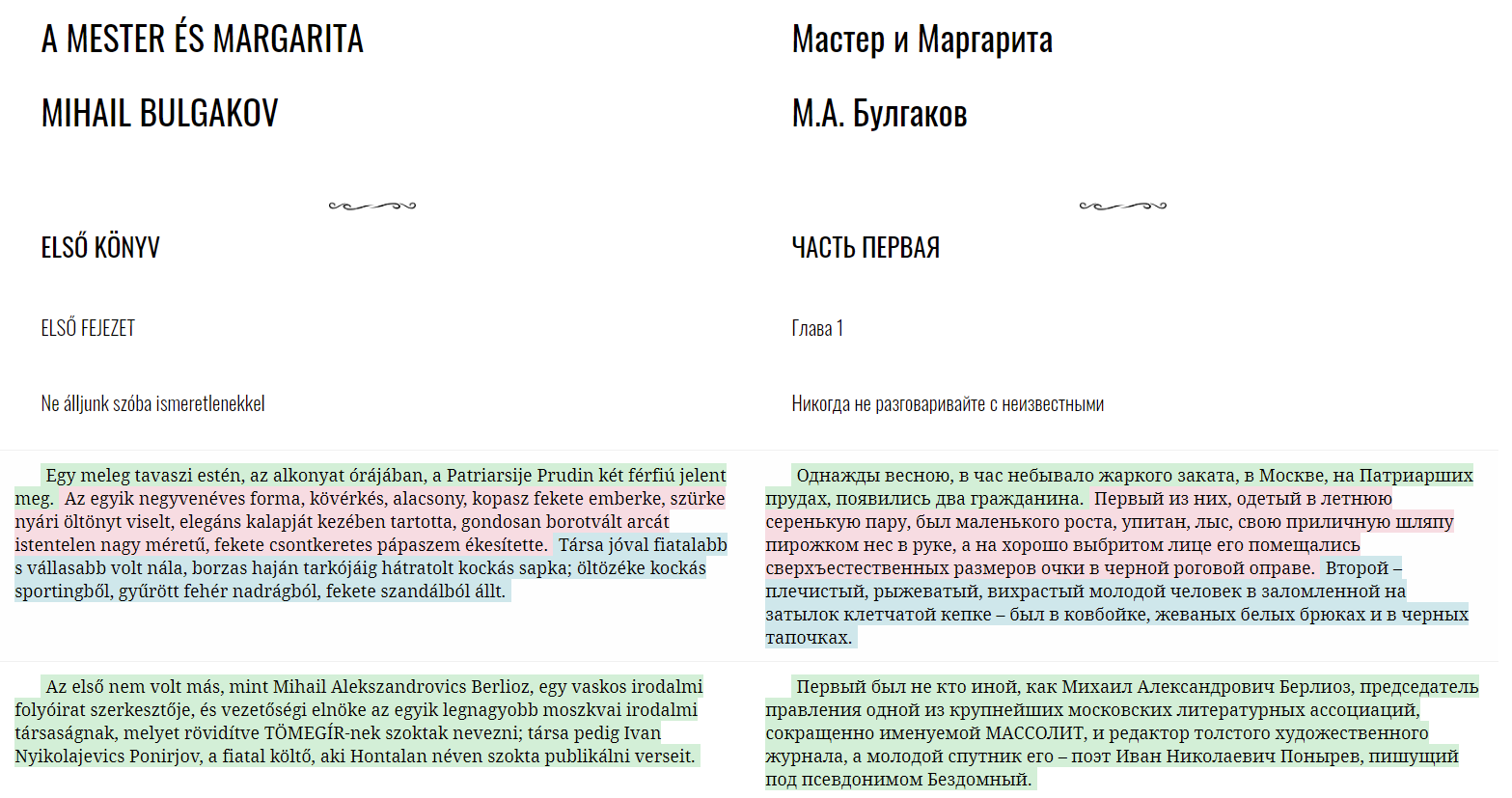
1.
( , ).
- ( , , , ).
- .
- (H1 , H5 ), .
- , , ( ).
, . , . .
, :
| %%%%%title. | ||
| %%%%%author. | ||
| %%%%%h1. %%%%%h2. %%%%%h3. %%%%%h4. %%%%%h5. | ||
| %%%%%divider. | ||
| %%%%%. |
, , . .
, :
%%%%%title. .. %%%%%author. %%%%%h1. 1%%%%%h2. %%%%%h2. , , , , . , , , , , , . – , , – , . ...
MIHAIL BULGAKOV%%%%%author. A MESTER ÉS MARGARITA%%%%%title. ELSŐ KÖNYV%%%%%h1. ELSŐ FEJEZET%%%%%h2. Ne álljunk szóba ismeretlenekkel%%%%%h2. Egy meleg tavaszi estén, az alkonyat órájában, a Patriarsije Prudin két férfiú jelent meg. Az egyik negyvenéves forma, kövérkés, alacsony, kopasz fekete emberke, szürke nyári öltönyt viselt, elegáns kalapját kezében tartotta, gondosan borotvált arcát istentelen nagy méretű, fekete csontkeretes pápaszem ékesítette. Társa jóval fiatalabb s vállasabb volt nála, borzas haján tarkójáig hátratolt kockás sapka; öltözéke kockás sportingből, gyűrött fehér nadrágból, fekete szandálból állt. ...
. - , - . , .
2.
, lingtrain-aligner. , .
Colab
Colab , . . html .
pip install lingtrain-aligner
:
# from lingtrain_aligner import preprocessor, splitter, aligner, resolver, reader, vis_helper # text1_input = "master_hu.txt" text2_input = "master_ru.txt" with open(text1_input, "r", encoding="utf8") as input1: text1 = input1.readlines() with open(text2_input, "r", encoding="utf8") as input2: text2 = input2.readlines() # , db_path = "master_hu.db" # ( ) lang_from = "hu" lang_to = "ru" # models = ["sentence_transformer_multilingual", "sentence_transformer_multilingual_labse"] model_name = models[0] # text1_prepared = preprocessor.mark_paragraphs(lines1_prepared) text2_prepared = preprocessor.mark_paragraphs(lines2_prepared) # splitted_from = splitter.split_by_sentences_wrapper(lines1_prepared, lang_from, leave_marks=True) splitted_to = splitter.split_by_sentences_wrapper(lines2_prepared, lang_to, leave_marks=True)
9460 8996 . - , .
. SQLite , , .
aligner.fill_db(db_path, lang_from, lang_to, splitted_from, splitted_to)
, :
batch_ids = range(10) aligner.align_db(db_path, model_name, batch_size=100, window=60, batch_ids=batch_ids, save_pic=False, embed_batch_size=25, normalize_embeddings=True, show_progress_bar=True )
— ( ), 10 (batch_ids — ) 100 ( batch_size). window "" , . , " " .
, . ( ), shift ( ).
vis_helper:
vis_helper.visualize_alignment_by_db(db_path, output_path="alignment_vis.png", batch_size=100, size=(800,800), lang_name_from=lang_from, lang_name_to=lang_to, batch_ids=batch_ids, plt_show=True)
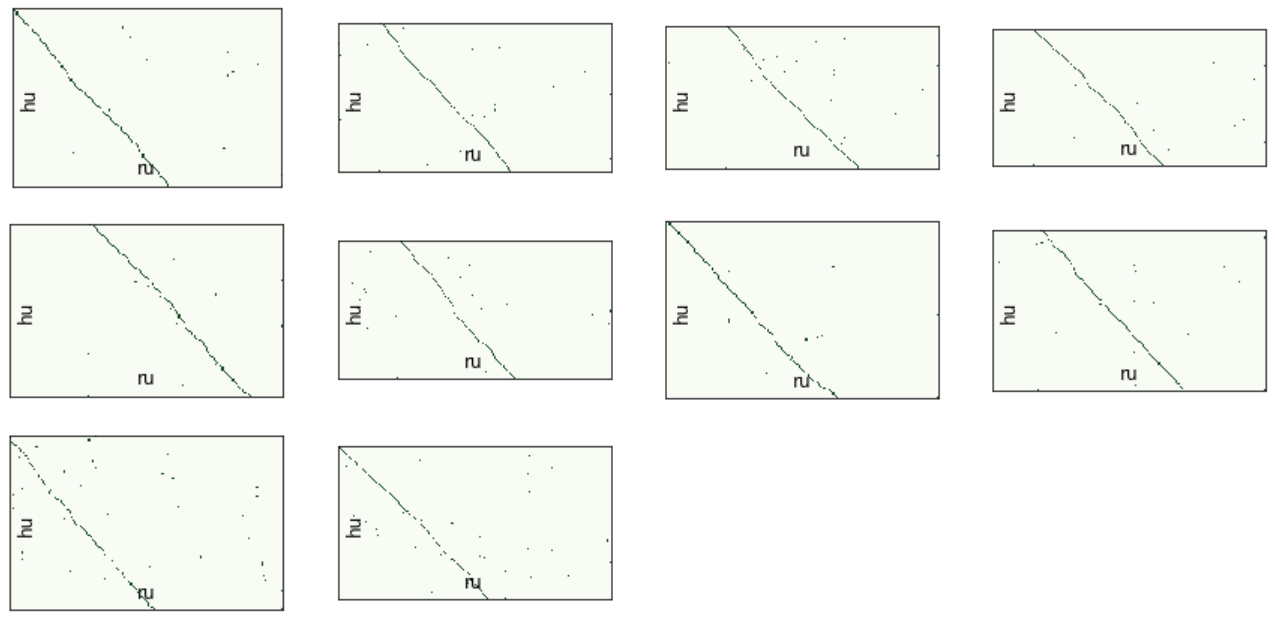
batch_ids , . , .
, . , " " , .
.
resolver. , , . , , . , . , — :
steps = 3 batch_id = -1 # for i in range(steps): # conflicts, rest = resolver.get_all_conflicts(db_path, min_chain_length=2+i, max_conflicts_len=6*(i+1), batch_id=batch_id) # resolver.get_statistics(conflicts) resolver.get_statistics(rest) # resolver.resolve_all_conflicts(db_path, conflicts, model_name, show_logs=False) if len(rest) == 0: break
. , :
# conflicts, rest = resolver.get_all_conflicts(db_path, min_chain_length=2, max_conflicts_len=20, batch_id=-1) # resolver.get_statistics(conflicts) resolver.get_statistics(rest) # resolver.resolve_all_conflicts(db_path, conflicts, model_name, show_logs=False) # vis_helper.visualize_alignment_by_db(db_path, output_path="alignment_vis.png", batch_size=100, size=(800,800), lang_name_from=lang_from, lang_name_to=lang_to, batch_ids=batch_ids, plt_show=False)
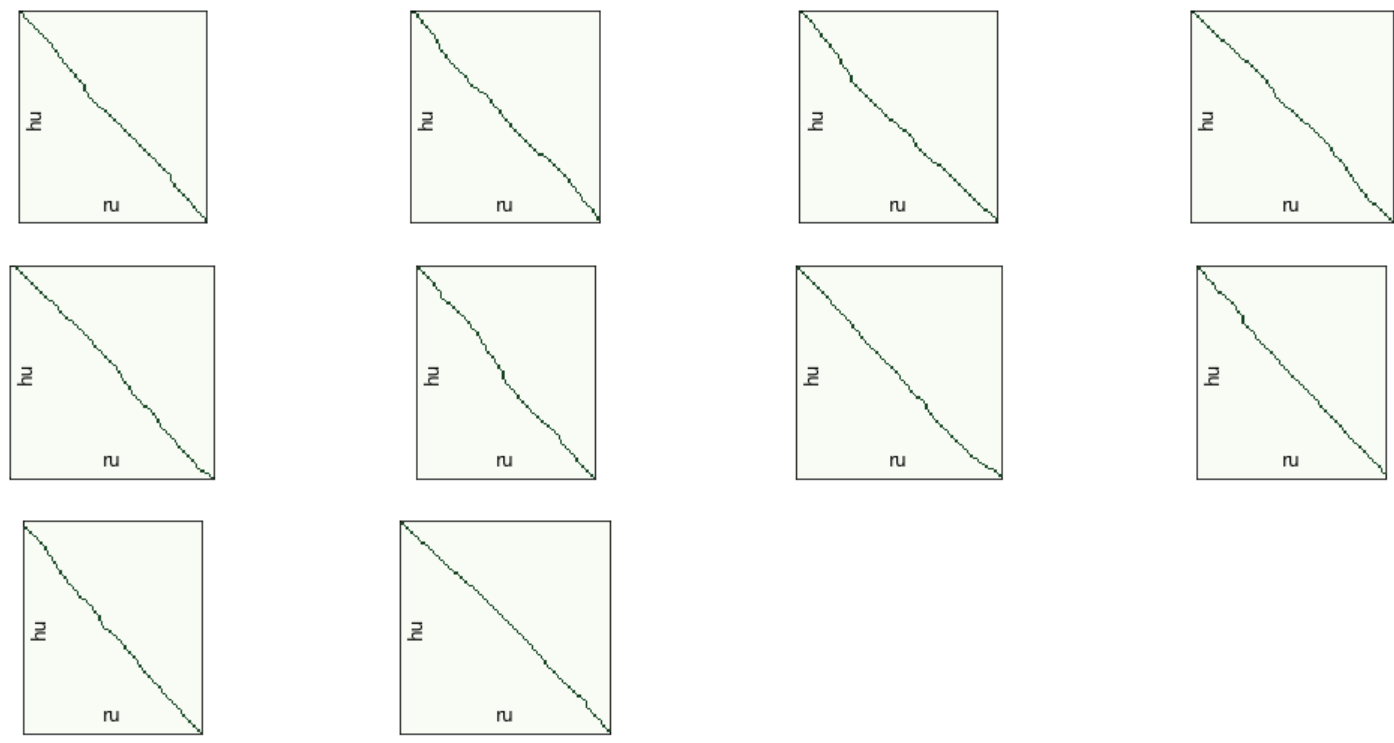
. , . 4000 . 10 100 , :
batch_ids = range(10, 50) aligner.align_db(db_path, \ model_name, \ batch_size=100, \ window=60, \ batch_ids=batch_ids, \ save_pic=False, embed_batch_size=25, \ normalize_embeddings=True, \ show_progress_bar=True )
( , ) , . , . 9460, , 100 95 .
batch_ids = range(50, 100)
( ) . master_hu, - " ".
3.
, reader, - :
from lingtrain_aligner import reader # paragraphs_from, paragraphs_to, meta = reader.get_paragraphs(db_path, direction="from") # html reader.create_book(paragraphs_from, paragraphs_to, meta, output_path = "lingtrain.html")

html . . , :
reader.create_book(paragraphs_from, paragraphs_to, meta, output_path = f"lingtrain.html", template="pastel_fill")

, :
# span' my_style = [ '{"background": "linear-gradient(90deg, #FDEB71 0px, #fff 150px)", "border-radius": "15px"}', '{"background": "linear-gradient(90deg, #ABDCFF 0px, #fff 150px)", "border-radius": "15px"}', '{"background": "linear-gradient(90deg, #FEB692 0px, #fff 150px)", "border-radius": "15px"}', '{"background": "linear-gradient(90deg, #CE9FFC 0px, #fff 150px)", "border-radius": "15px"}', '{"background": "linear-gradient(90deg, #81FBB8 0px, #fff 150px)", "border-radius": "15px"}' ] reader.create_book(paragraphs_from, paragraphs_to, meta, output_path = f"lingtrain.html", template="custom", styles=my_style)
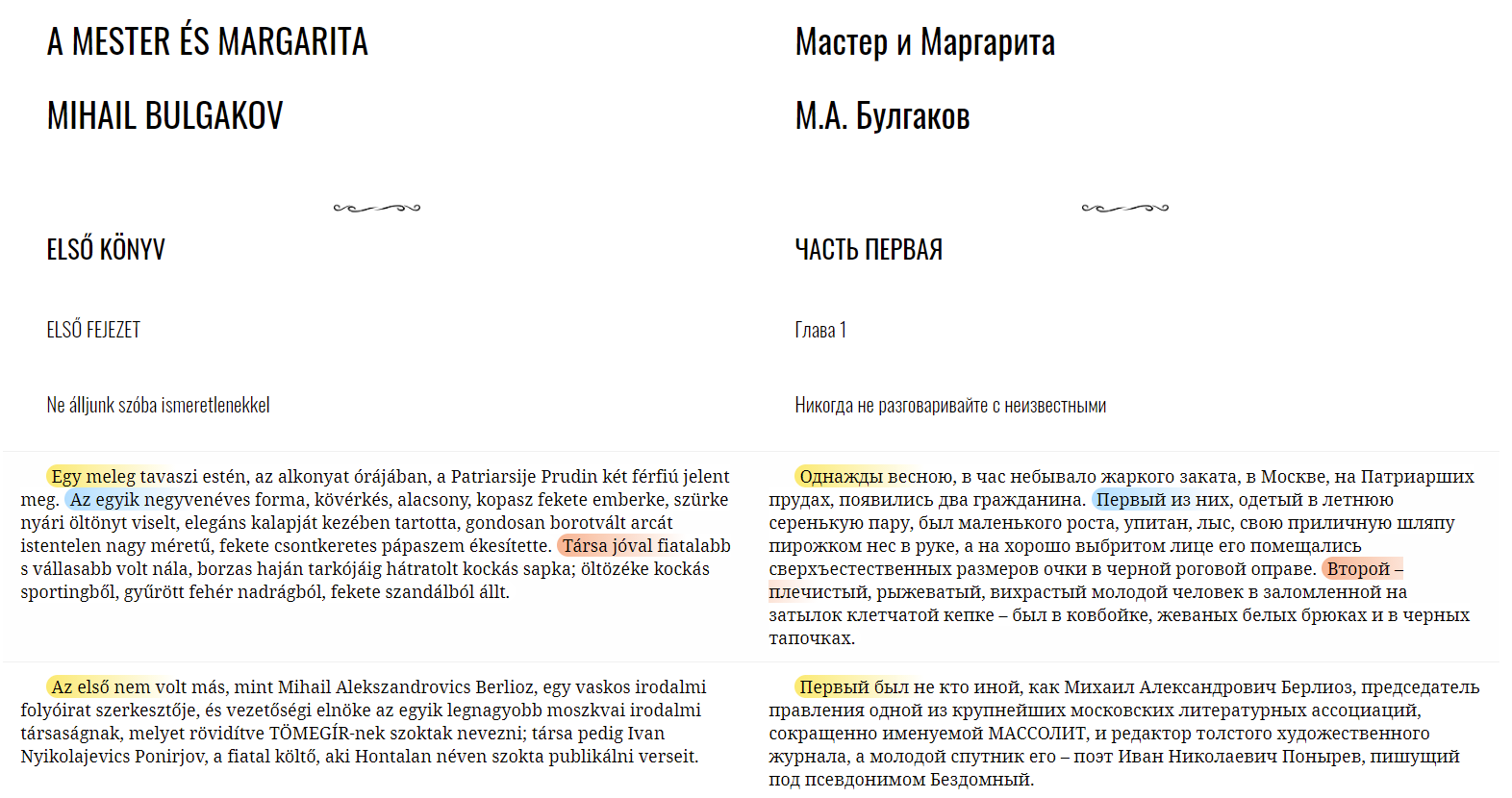
, , master_hu.db . , (, , , ).
, .
1. – ! – , – , , ! 2. - - , – , , .
1. 'Pah, the devil!' exclaimed the editor. 2. 'You know, Ivan, I nearly had heat stroke just now! 3. There was even something like a hallucination...' 4. He attempted to smile, but alarm still jumped in his eyes and his hands trembled.
9707 8996 . , window=100 1000 .

, .

, .
, , . (8190 ) . 100 , — :
batch_ids = range(10,12) aligner.align_db(db_path, \ model_name, \ batch_size=200, \ window=100, \ batch_ids=batch_ids, \ save_pic=False, embed_batch_size=25, \ normalize_embeddings=True, \ show_progress_bar=True )
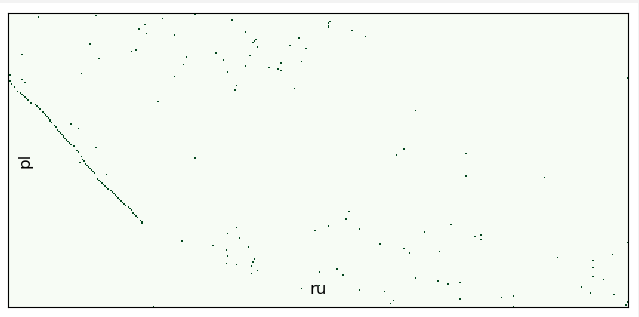
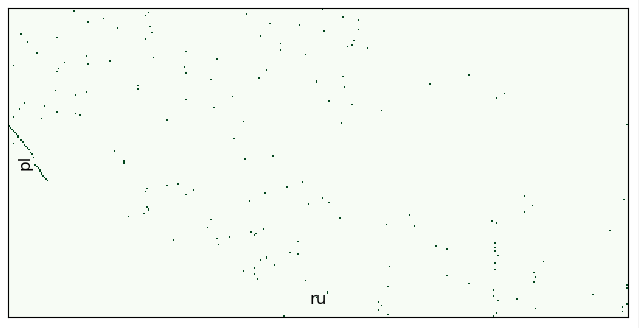
, shift. :
batch_ids = range(10,12) aligner.align_db(db_path, \ model_name, \ batch_size=200, \ window=100, \ batch_ids=batch_ids, \ save_pic=False, embed_batch_size=25, \ normalize_embeddings=True, \ show_progress_bar=True, shift=-100 # )
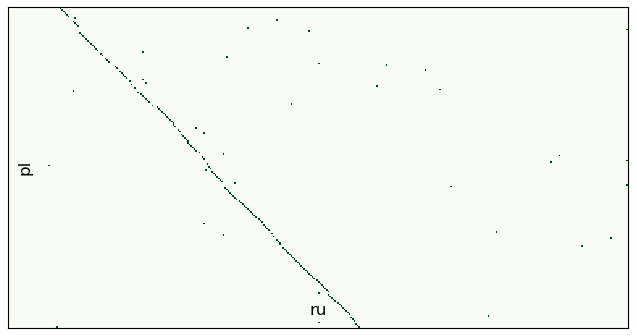

, , . .
:


, - :


, - . - ( ), , , . 20 , .
master_*.
, (). , .
:

, ( ) . , . , . , ( *.db ).
, . , .
:
par_struct_1 = [2, 5, 6, 8, 10, 12, ...] par_struct_2 = [2, 6, 8, 10, 11, 12, ...] res = [2, 6, 8, 10, 12, ...]
, :

, .
, , :

, . , , — .
. :
[ -- [ -- [1, "[1,2]", 1, "[1]"], -- .. [2, "[3]", 2, "[2]"], [3, "[4,5]", 3, "[3]"], [4, "[6]", 4, "[4,5,6]"], ... ], -- [ [1, "[100]", 1, "[105]"], ... ], ... ]
"" "". — , — , .
:
- ,
- ,
- ,
, . , . :
[[1], [2], [3]] -> [[1, 2, 3], [4], [5]] -> [[1], [2], [3]] [[4]] -> [[6]] -> [[4]] [[5]] -> [[7]] -> [[5, 6]] ...
— , — . .
, :

( ), , . , :

4.
get_paragraphs() create_book(). , .
get_paragraphs_polybook(), . , , . ( ):
from lingtrain_aligner import resolver conflicts_to_solve, rest = resolver.get_all_conflicts(db_path, min_chain_length=2, max_conflicts_len=20, batch_id=-1) # resolver.get_statistics(conflicts_to_solve) resolver.get_statistics(rest)
:
from lingtrain_aligner import reader db_path1 = "db/master_de.db" db_path2 = "db/master_uk.db" db_path3 = "db/master_be.db" db_path4 = "db/master_zh.db" db_path5 = "db/master_cz.db" db_path6 = "db/master_en.db" db_path7 = "db/master_hu.db" paragraphs, metas = reader.get_paragraphs_polybook( db_paths=[db_path1, db_path2, db_path3, db_path4, db_path5, db_path6, db_path7])
Now the most interesting thing is that we can choose the languages we need and create our book. You can, for example, take English and German, many learn these languages in pairs.
reader.create_polybook( lang_ordered=["en", "de", "ru"], paragraphs = paragraphs, delimeters = delimeters, metas = metas, output_path = "lingtrain_master.tml", template="none")
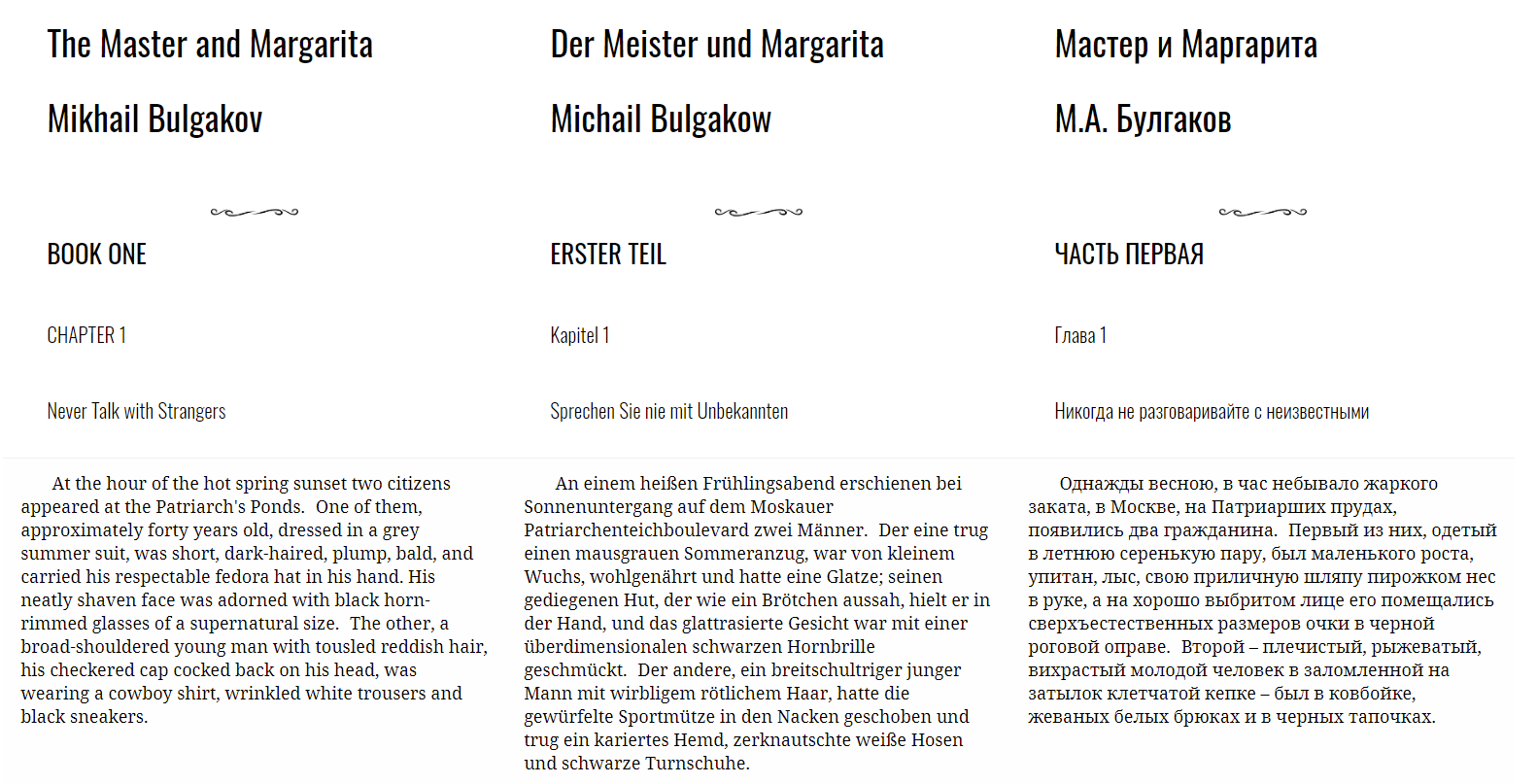
The lang_ordered parameter specifies the set and order of languages.
You can make a Belarusian-Chinese version:
reader.create_polybook( lang_ordered=["be", "zh"], paragraphs = paragraphs, delimeters = delimeters, metas = metas, output_path = "lingtrain_master.html", template="none")
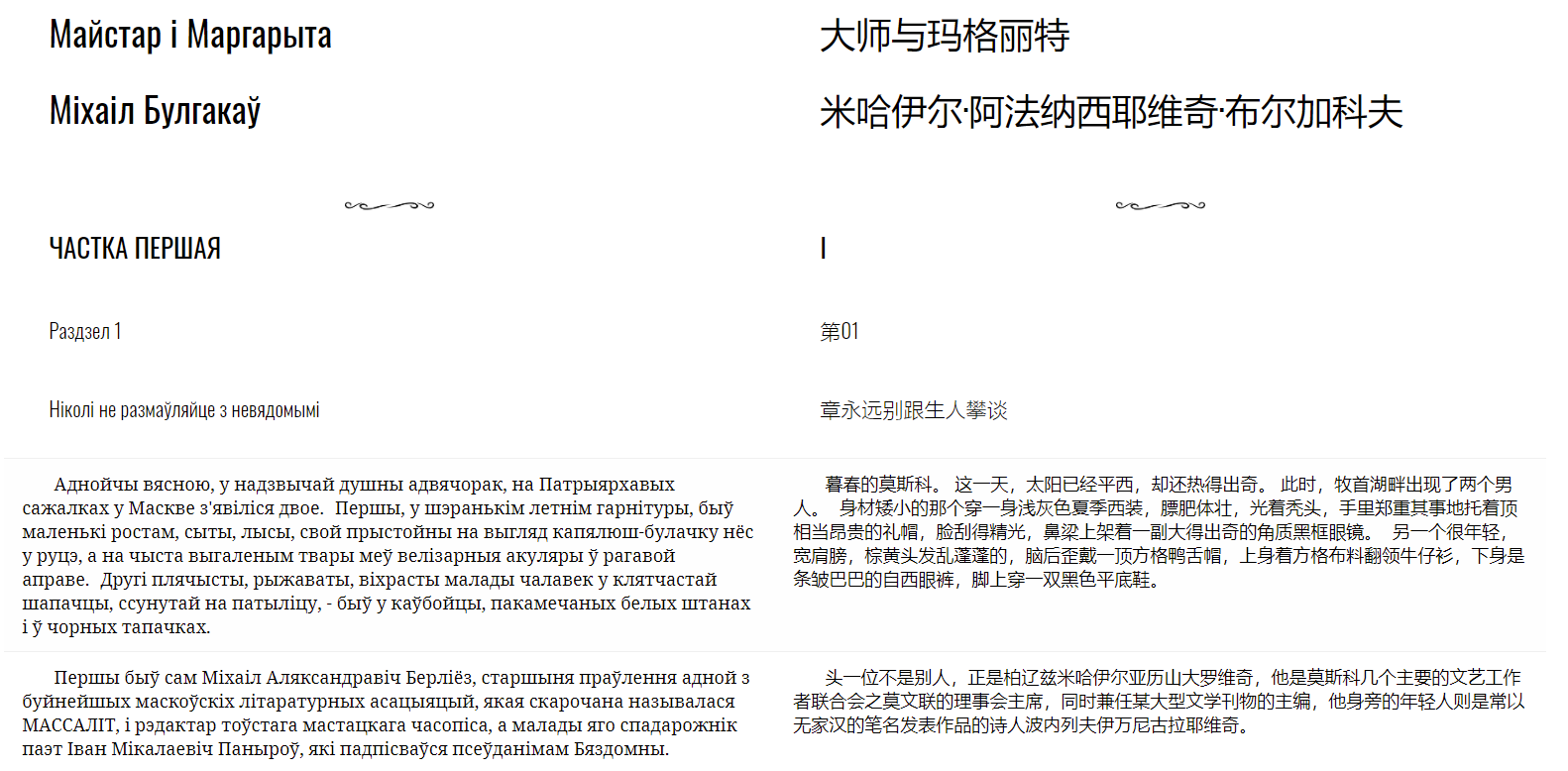
You can, of course, take everything:
reader.create_polybook( lang_ordered = ["ru", "en", "de", "be", "uk", "cz", "hu", "zh"], paragraphs = paragraphs, delimeters = delimeters, metas = metas, output_path = "lingtrain_master_total.html", template="none")

It is better to leave those alignments (* .db files), the languages of which you need. This will keep as much information about the paragraphs as possible. With styles, everything is as before, you can set template (now there is "pastel_fill", "pastel_start"), you can invent your own - examples are above and in the notebook on Colab. If you set template = "none" , you get a blank book.
Plans and support
- fb2 . , . -, .
- , http://t.me/lingtrain_books.
- . - .
:
[2] lingtrain-aligner github
[3] Google Colab
[4]
[5] PDF. Seven parallel books "The Master and Margarita"
[6] Telegram group